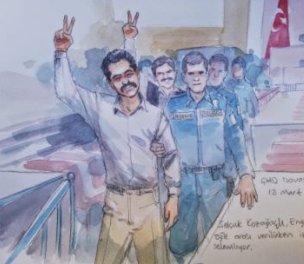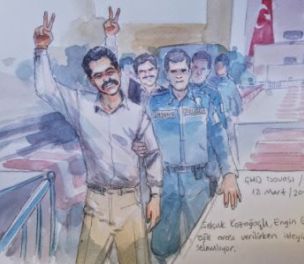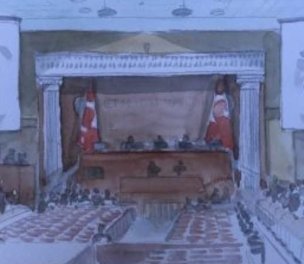Drawing: Murat Başol
Click to read the article in Turkish
An expert examination has found that digital materials submitted as evidence against arrested lawyer Selçuk Kozağaçlı cannot be considered as "legal evidence."
The expert report says "it cannot be clearly stated that the evidence had not been altered or manipulated."
In yesterday's (September 15) hearing of the retrial of the Progressive Lawyers' Association (ÇHD) case, Kozağaçlı said, "There is talk of digital materials shown as evidence against me. I say that evidence does not exist. It doesn't physically exist.
"We say 'Bring it' and it has not been brought for years because there is no such evidence. Police say these digitals exist. You say 'It exists,' I say 'It doesn't exist, you are lying'."
The expert report signed by Forensic Informatics Engineer and Forensic Expert Tuncay Beşikçi had also been submitted to the İstanbul 37th Heavy Penal Court, where the first trial was held.
Citing this report in the trial, attorney Hasan Fehmi Demir had said the case filed hadn't included the original of the "digital material" in question.
"The evidence is at the Security Directorate. Not only originals but also images of the evidence are missing in the file. There are only image reports," he had said.
The expert report
In the report, Beşikçi says the defendants and their attorneys had not been given the originals and images of the files in violation of article 134 of the Code of Criminal Procedures. Hence, he had not been able to examine the evidence.
• While the digital evidence, its forensic copies and HASH values had been recorded in the minutes, they hadn't been not delivered to the defending party, which contradicted the principle of commonness of evidence, says the report.
"As long as it is not delivered to the suspects of their attorneys, it cannot be clearly stated whether or not the evidence was altered and whether or not the evidence was manipulated; according to relevant laws, regulations and and standards, the image copies of the evidence in the case file cannot be considered as legal evidence unless they are not handed to the defending party..."
• The digital examination report prepared by the General Directorate of Security did not include the HASH values and metadata, which included the dates of the creation, changes and the last change of the files and which computers and users processed the files, according to the report.
"It is understood that the original digital material acquired from the Netherlands and Belgium is at the Directorate of forensic Safe Deposits and the forensic copies of it are at the İstanbul Counterterrorism Department Branch Directorate; although the evidence was requested by the court to be given to the defending party, only the print versions of it rather than the forensic images were copied to a CD and sent [to the court] by the Security Directorate..."
Based on article 217 of the Code of Criminal Procedures, the report concluded that the digital material cannot be accepted as "legal evidence" unless it was given to the defending party.
What is HASH value?Beşikçi says in the report that digital evidence can only be regarded as legal evidence when it's ensured that it has not been altered in any way. "Some mechanisms have been developed to prove the accordance of the obtained digital evidence with the original. The most important one of these mechanisms is is the HASH information, which can also be defined as a one-way summary algorithm used to control data integrity. "The HASH or summary value is used to prove that the methods applied in Forensic Informatics investigations have not changed the evidence. The HASH value is very useful to reveal the smallest change to be made in the data." |
The ÇHD case
In the trial of lawyers from the Progressive Lawyers' Association (ÇHD), the court announced its ruling on March 20, 2019 and gave prison sentences ranging from 18 years, 9 months to 3 years, 1 month, 15 days. The 2nd Penal Chamber of the İstanbul Regional Court of Justice rejected the objections in October 2019 and sent the file to the Court of Cassation.
The Chief Public Prosecutor's Office of the Court of Cassation expressed the opinion that over 159-year prison sentences of all lawyers, except for the one given to lawyer Barkın Timtik, be upheld.
The letter of notification only indicated that the prison sentence of 18 years, 9 months given to Barkın Timtik for "establishing and leading an organization" as per the Article 314/1 of the Turkish Penal Code (TCK) should be overturned and he should also be penalized for "membership of an organization" like other lawyers.
The letter of notification issued by the prosecutor's office was sent to the 16th Penal Chamber of the Court of Cassation.
ÇHD executive lawyer Ebru Timtik and ÇHD member lawyer Aytaç Ünsal went on a death fast in prison for their right to a fair trial. They were referred to hospital on July 30, 2020. Timtik lost her life on August 27 on the 238th day of her death fast. Ünsal ended his fast, he is now in treatment.
The Court of Cassation upheld all sentences, except for the ones given to lawyers Barkın Timtik, Selçuk Kozağaçlı and Ezgi Çakır.
Prison sentences upheld by the Court of Cassation on September 15, 2020:
Özgür Yılmaz: 13 years, 6 months
Behiç Aşçı: 12 years
Şükriye Erden: 12 years
Engin Gökoğlu: 10 years, 6 months
Aytaç Ünsal: 10 years, 6 months
Süleyman Gökten: 10 years, 6 months
Ayçan Çiçek: 9 years
Naciye Demir: 9 years
(AS/VK)











-132.jpg)


as.jpg)






